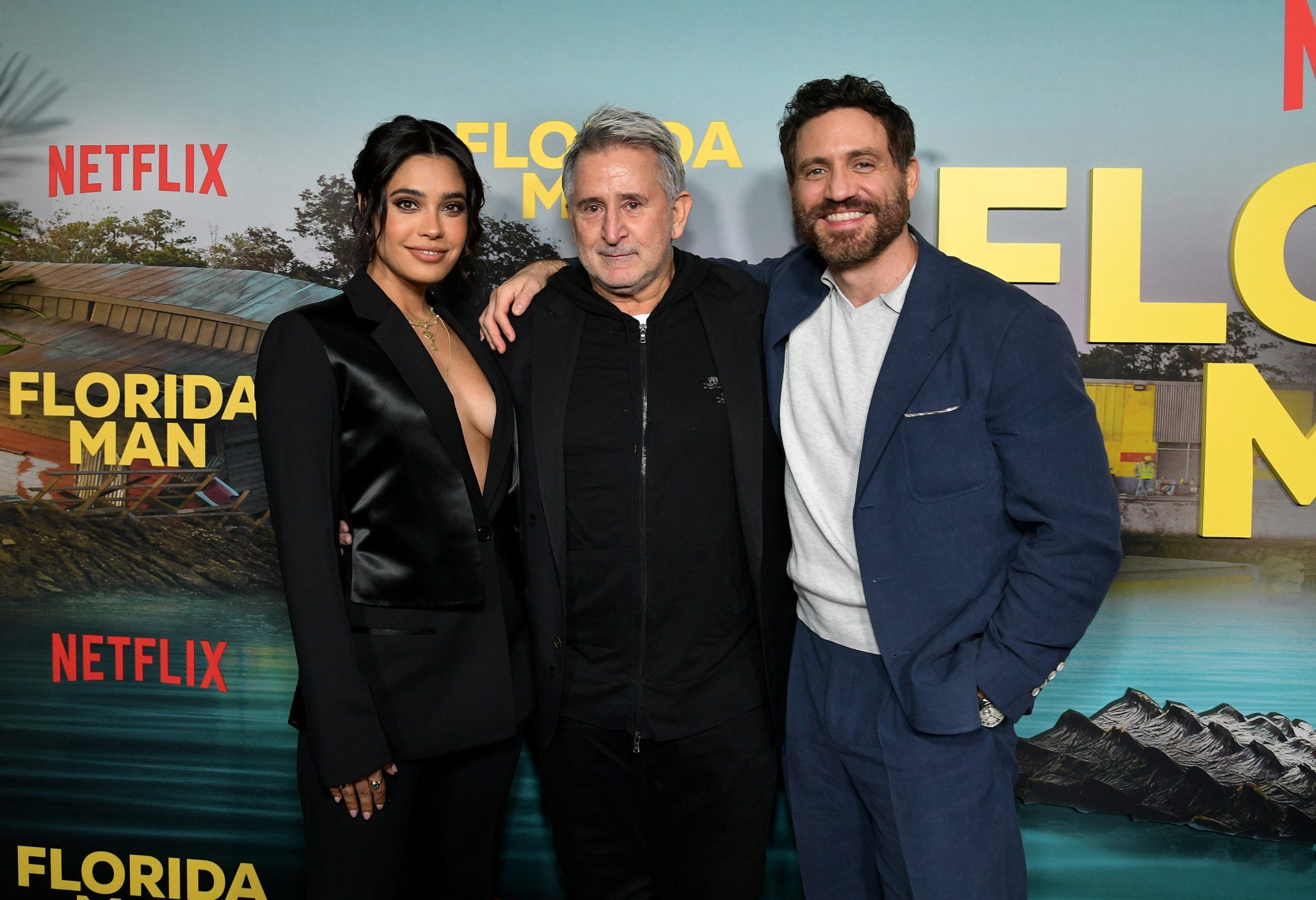

Édgar Ramírez as Mike Valentine in Netflix’s ‘Florida Man’ (Jackson Lee Davis/Netflix)
Latin American accents seem to be having a moment in Hollywood.
Diego Luna carried his into a galaxy far, far away as the titular character in Andor. Ana de Armas couldn’t shake her Cuban accent even when playing Marilyn Monroe in Blonde—though she won an Oscar nomination for her trouble. Guillermo del Toro took on the Hitchcock role in his Cabinet of Curiosities, Mexican accent and all.
Which brings us to our latest entry: Netflix’s Florida Man. Here, Édgar Ramírez plays the titular character Mike Valentine while sporting his Venezuelan accent unabashedly.
https://www.youtube.com/watch?v=Juyodtul_7s
Valentine is an ex-cop whose gambling addiction got him in trouble with the mob. He works for them to pay off his debt, sleeping with the boss’s girl along the way. When she runs off to Florida, he follows her, and soon they’re chasing buried treasure through a plot line that is determined to tell as many Florida-as-idiot-filled-hellscape jokes as possible. For example, a man dies by exploding porta-potty after igniting his lighter while locked inside one.
We meet Mike’s sister Patsy (Otmara Marrero) and father Sonny (Anthony LaPaglia), and hear the mob boss describe Mike as “from somewhere, I don’t know where but not here.” What marks Mike as foreign is not his dress, skin tone or mannerisms, but his accent. And here’s where the trouble comes in.
Mike is supposed to be from Florida—as in, he grew up there and doesn’t appear to be an immigrant. Now, while it’s plausible that he still could have a Venezuelan accent, neither his sister nor his dad has one (his mom, we soon learn, is deceased).


From left to right, Otmara Marrero, Anthony LaPaglia, and Édgar Ramírez attend Netflix’s ‘Florida Man’ special screening at the Roma Theatre on April 12, 2023, in Los Angeles, California. (Charley Gallay/Getty Images for Netflix)
Part of me wants to believe the creators of Florida Man and Hollywood in general are trying to normalize a Latin American accent by including it in all sorts of stories whether it belongs or not. Give actors like Ramírez and de Armas all the roles, even if they can’t do an American accent! We need more Latinx representation on screen, and maybe this is the way we get it.
But the more cynical part of me sees it as just another example of Hollywood misunderstanding and taking for granted Latinx audiences. Did no one on the Florida Man set suggest that Marrero and LaPaglia learn Ramírez’s accent so the story would make sense—or, at the very least, that these characters should speak Spanish to each other, if only once or twice? Because how else would Mike Valentine come to speak with an accent?
I doubt such a discussion was had. Florida Man is a hastily put-together genre schtick. Not a lot of nuance or depth there.
But what about Andor? That show had all the money and prestige, and Luna didn’t even discuss losing his accent for the character. In the Star Wars universe, we’ve heard all sorts of English, mostly U.S. and British. But Luna’s Mexican accent, when it appeared nearly 40 years after the first Star Wars film, was new—so new that the show felt the need to explain. As it turns out, Cassian Andor is the lone survivor of a planet-wide genocide—and now an undocumented immigrant, to put it in present-day terms. That’s why he’s the only person in the universe with that particular accent.
But that setup implies Andor will also be the last to speak that way, which is frustrating, to say the least. Why can’t a Mexican accent be as normal as an Irish one, when we’re so far from Earth anyway?
We know why, of course. For those of us in this world, the ones making and consuming today’s content, we know that U.S. and British accents are considered “normal” in the entertainment industry in the way that Latin American ones are not. Maybe they’re sexualized —perhaps that’s why de Armas as Marilyn made so much sense— but usually, even that is reserved for Spanish-from-Spain folks like Penelope Cruz and Javier Bardem.


Édgar Ramírez as Mike Valentine in Netflix’s ‘Florida Man’ (Courtesy of Netflix)
And shows like Andor and Florida Man are only half normalizing the accents anyway. Yes, their leading men have them, and as such the shows ask us to sympathize and relate to these characters. But their way of speaking serves as signs of their foreignness, their difference—a.k.a. the opposite of normal.
It’s a bit of a conundrum. Andor perhaps put too much thinking into Luna’s accent, while Florida Man puts too little into Ramírez’s.
The thing is, though, I do want even more characters with Latin American accents leading shows. And I want how they speak to make sense within those shows. And I want that to happen without the character’s accent always having to be a sign that they’re different from everyone else around them.
A lot of people have accents. It’s normal. And with a little more respect and knowledge, Hollywood might finally portray them that way.
***
Cristina Escobar is the entertainment reporter for Latino Rebels. She is also the co-founder of latinamedia.co, uplifting Latina and gender non-conforming Latinx perspectives in media. She’s a member of the Latino Entertainment Journalists Association and writes at the intersection of race, gender, and pop culture. Twitter: @cescobarandrade



what matters is how many will watch. thats all that matters.
I agree I was watching the show kind of confused thinking why doesn’t the dad have an accent? Then I thought okay was he adopted in the show or what is the angle here?! Lol glad someone else noticed this. I agree it’s cool to have the accent, just make it make sense and tie in somehow to the characters back story.
A sign of a good actor is being able to loose the accent…. Unless your Arnold are